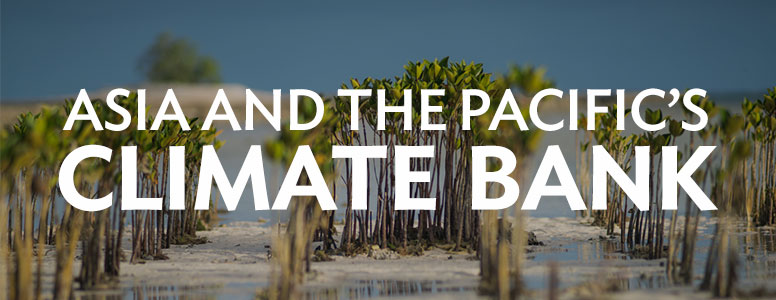Office of Professional Ethics
and Conduct
The Office of Professional Ethics and Conduct supports an enabling environment for a professional and positive workplace of dignity and mutual respect, both at headquarters and in field offices, in line with ADB Strategy 2030.
The Asian Development Bank (ADB) launched the Office of Professional Ethics and Conduct (OPEC) in May 2020 to foster a positive work environment, where staff members and other personnel of the ADB and the ADB Institute (ADBI) are treated with respect and dignity.
OPEC’s mandate is underpinned by ADB’s commitment for a respectful and inclusive workplace under ADB Strategy 2030. The Office is located at the ADB Headquarters in Manila and is headed by a Director, Christel Adamou. OPEC reports annually to the President and the Board of Executive Directors on all its activities.
About Us
Since it opened at the start of the pandemic, OPEC has grown from two to four members of staff, who between them have a wealth of experience in international administrative law, employment law, dispute resolution, and human resources management.
They are also experienced coaches and mediators who play a hands-on role in helping staff navigate ethical dilemmas or resolve cases such as harassment, bullying, and discrimination in the workplace.
The team, which is diverse and multilingual, understands the sensitivity, complexity, and psychological stress workplace issues can cause and is committed to responding to inquiries within a maximum of two business days.
OPEC is:
- independent from all other departments and offices, and reports directly to the President;
- impartial in carrying out its functions;
- bound by confidentiality;
Our Mandate
OPEC carries out its work through six activities:
- Advice relating to the Code of Conduct;
- Review and Clearance as needed of possible conflicts of interest upon recruitment and through the Annual Declaration of Compliance;
- Resolution of workplace concerns, including complaints of harassment, bullying and discrimination through mediation or referral to other relevant offices/departments;
- Protection against retaliation;
- Training, outreach and awareness raising;
- Policy revisions.
OPEC services are available to any staff member, former staff member, retiree, consultants, contractors, and other third party who need advice on the application of ADB’s Code of Conduct, in connection with the activities of ADB and ADB Institute. The scope of OPEC’s mandate is limited to Staff members and other personnel covered by the Code of Conduct. It does not extend to Board Directors, Alternate Directors, and to the President who are covered by a separate Code of Conduct (Board Code of Conduct). For example, OPEC’s review of possible misconduct is limited to allegations brought against current and former staff members. Allegations about unethical conduct by a consultant, contractor, Board Members, the President, or any other third party cannot be assessed by OPEC, but may be submitted through the OPEC who will refer the matter to the appropriate office.

Advice on ADB's Code of Conduct
The OPEC is mandated to provide confidential advice and guidance on code of conduct-related matters to all ADB employees, regardless of their duty station, grade or contractual status. Any employee may contact OPEC at any time, to seek assistance in dealing with any code of conduct-related issue.
Through this confidential service, employees are able to share with OPEC their issues and/or concerns, identify the rules and policies applicable to a given situation, examine their options and understand possible consequences. Employees are provided guidance to assist them in identifying, mitigating and managing issues and making ADB value-based decisions that serve the best interests of the ADB and its staff.
Confidential advice may be provided for the following situations:
- Dysfunctional interpersonal relationships
- Incivility (outbursts, rudeness…)
- Harassment, including sexual harassment, and discrimination
- Procedures and available dispute resolution mechanism
- Conflicts of interest (including but not limited to outside activities, honours, decorations, gifts, favours, pre and post-employment);

Disclosure of Possible Conflicts of Interest
Upon joining ADB and subsequently once a year, all staff and other personnel under ADB’s Code of Conduct are required to acknowledge ADB policies relating to professional conduct, ethics and integrity, and to disclose possible conflicts of interest for them or their close relatives. OPEC reviews such declarations and provides clearance as appropriate.

Workplace Concern Resolution
OPEC aims to foster a work environment in which employees interact with each other in ways that show the greatest mutual respect and dignity.
OPEC is mandated to support the resolution of workplace concerns, including reports of alleged harassment, discrimination, retaliation, abuse of authority as well as other forms of misconduct. OPEC will assess the report and provide guidance on how to handle the situation, as well as on available resources and procedures. It can make recommendations and facilitate resolution through mediation. It can facilitate resolution through mediation or referral to the Office of Anticorruption and Integrity (OAI) for investigation and recommend interim protection during the course of assessment or investigation as necessary.
Any information disclosed to OPEC through a report will be dealt with confidentiality and will not be released to anyone within the ADB or externally without the prior consent of the person approaching OPEC.
OPEC can provide advice as to whether a given situation can be dealt with or whether it should refer the matter to the Office of Anticorruption and Integrity (OAI) for investigation.

Workplace Mediation Services
OPEC has set up mediation services to help resolve workplace concerns. Mediation provides a confidential, impartial, voluntary, and flexible resolution process for ADB staff to address and resolve workplace concerns with the support of a neutral and independent mediator. The mediator facilitates dialogue between the parties to a dispute and assists them in reaching a mutually acceptable resolution, which is usually put in writing (in the form of an agreement) and becomes binding once signed by the parties. OPEC has a roster of 14 mediators located in Asia, the Pacific and Europe.

Protection Against Retaliation
OPEC provides protection of ADB employees against retaliation through ADB’s Whistleblower and Witness Protection Policy.
The policy aims at promoting a speak up culture and ensuring that the ADB functions in an open and transparent manner by offering protection to those who report misconduct, provide information in good faith on alleged wrongdoing, or cooperate with OPEC or OAI. The above are considered “protected activities”. In order to receive protection from the ADB, the individual must act in good faith which implies a reasonable belief that the activity reported did, in fact, occur.
“Retaliation” means any direct or indirect detrimental action recommended, threatened or taken because an individual engaged in a protected activity under the ADB’s Whistleblower and Witness Protection Policy.
Domestic Violence
Recognizing the spillover of domestic violence as a workplace issue, OPEC serves as a Focal Unit with its staff experience in working with victims of abuse and in assessing and managing grievances and other workplace situations of a sensitive and complex nature.

Training, Awareness-Raising and Outreach
Outreach, awareness-raising and training programs are central to OPEC's work to promote constructive workplace behaviour and equip staff with the skills they need to avoid potential conflicts of interest and other issues that arise.
Drawing on its team's experience in employee relations, human resources management and dispute resolution, OPEC has designed and implemented a wealth of practice-oriented and interactive programs, some of which are mandatory for all staff and managers.
OPEC also builds capacity among staff, by setting up a CARE peer support group of staff located at headquarters and in resident missions to serve as a readily accessible resource staff can turn to for help.

